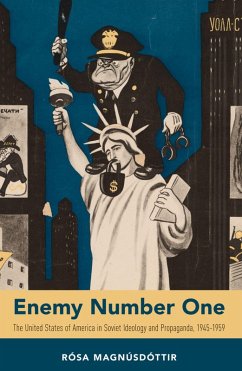Enemy Number One tells the story of the Soviet cultural and propaganda apparatus and its efforts to control information about the United States in the postwar landscape. Beginning with the 1945 meeting of American and Soviet troops on the Elbe, this period saw cultural relations develop in close connection to oppression as the Soviet authorities attempted to contain and appropriate images of the United States. Rósa Magnúsdóttir analyzes two official narratives about the USSR's "enemy number one" --Stalin's anti-American campaign and Khrushchev's policy of peaceful coexistence--and shows how each relied on the legacy of the wartime alliance in their approach. Stalin used the wartime experience to spread fear of a renewed war, while Khrushchev used the wartime alliance as proof that the two superpowers could work together. Drawing from extensive archival resources, Magnúsdóttir brings to life the propaganda warriors and ideological chiefs of the early Cold War period in the Soviet Union, revealing their confusion and insecurities as they attempted to navigate the uncertain world of late Stalin and early Khrushchev cultural bureaucracy. She also demonstrates how concerned Soviet authorities were by their people's presumed interest in the United States, resorting to monitoring and even repression-behavior indicative of the inferiority complex of the Soviet project as it related to the outside world.
Dieser Download kann aus rechtlichen Gründen nur mit Rechnungsadresse in A, B, BG, CY, CZ, D, DK, EW, E, FIN, F, GR, HR, H, IRL, I, LT, L, LR, M, NL, PL, P, R, S, SLO, SK ausgeliefert werden.









